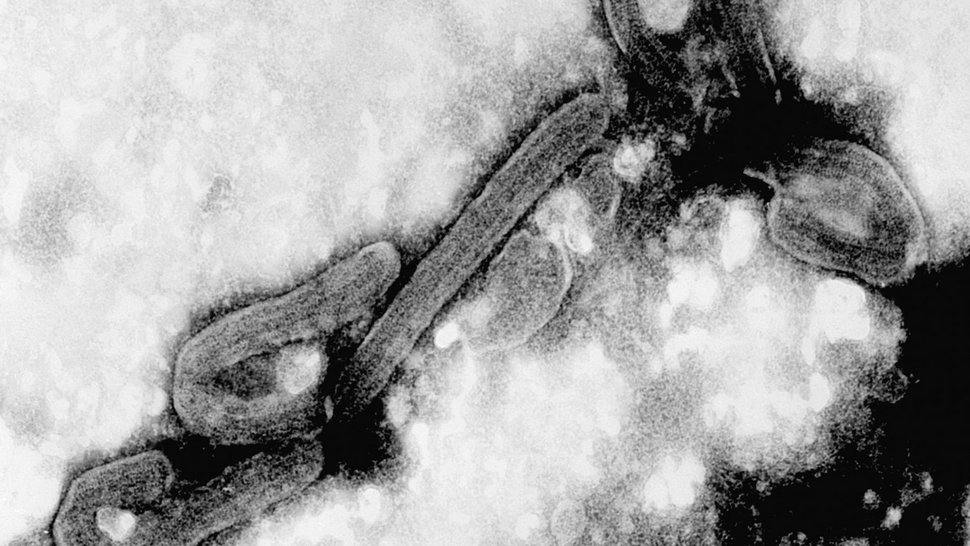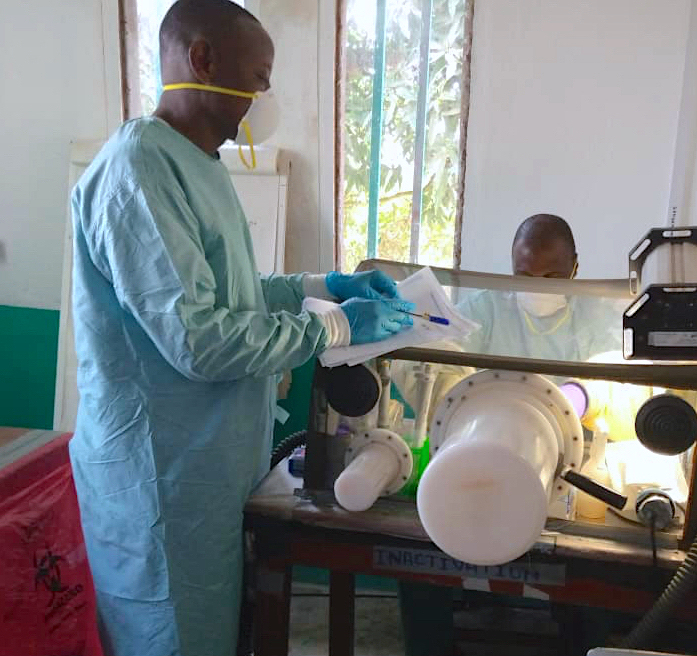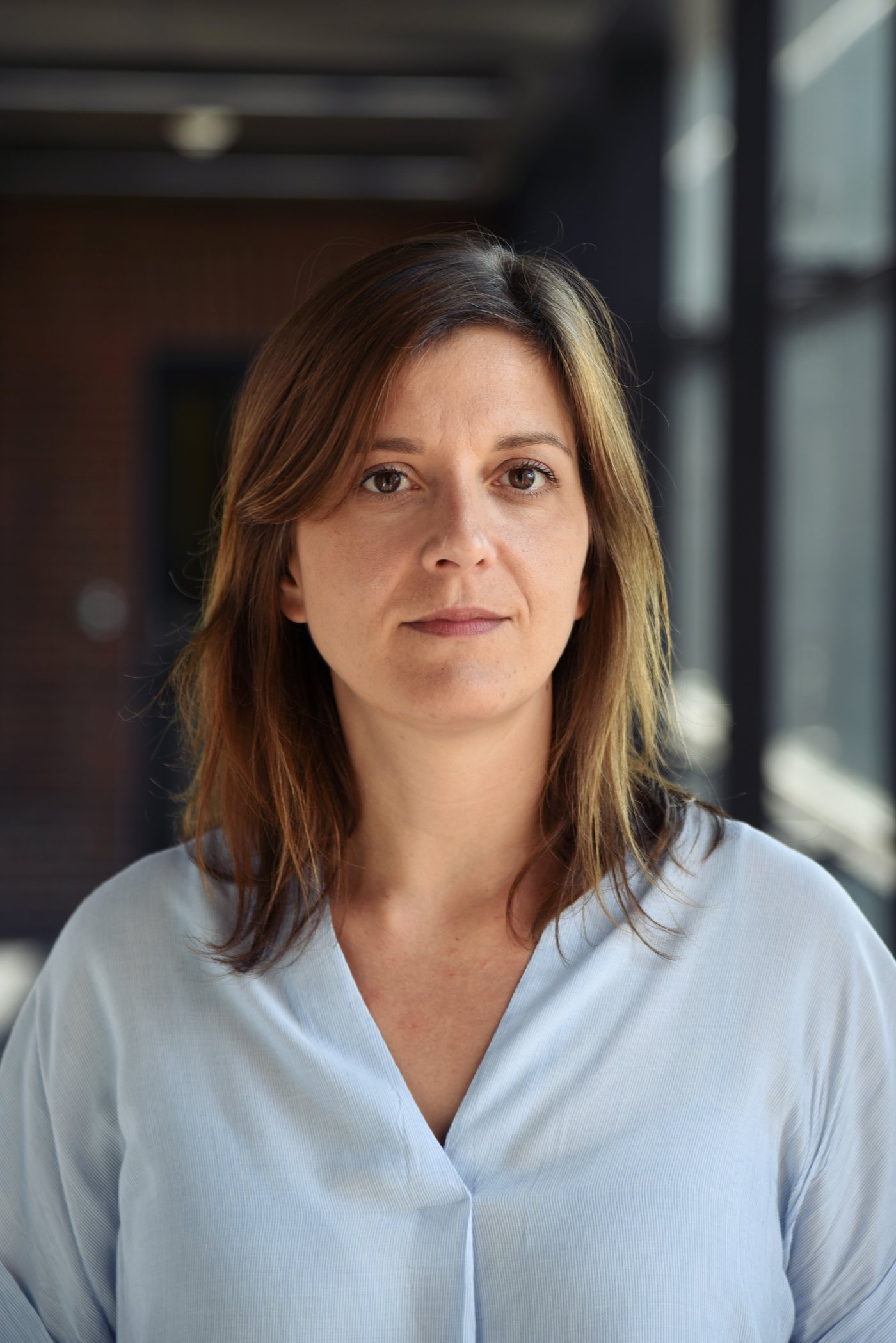Modern laboratory diagnostic rapidly detects Marburg virus in Guinea
Effektives Management
Hamburg / Conakry, 30. Juni 2022 – Erstmals hat eine internationale Forschungsgruppe die hochansteckende und oftmals auch tödlich verlaufende Marburg-Viruskrankheit in Westafrika nachgewiesen. Die Abteilung Virologie des Bernhard-Nocht-Instituts für Tropenmedizin (BNITM) in Hamburg und das Labor für hämorrhagische Fieberviren Guineas (LFHVG*) in Conakry haben in den vergangenen Jahren moderne Diagnosekapazitäten in Waldguinea aufgebaut. „Ein Schlüssel zur schnellen Erkennung und Eindämmung des Ausbruchs im August 2021 war das Frühwarnsystem tief im Landesinneren, in der Stadt Guéckédou“, erklärt Dr. Sophie Duraffour, Virologin am BNITM. Die renommierte Fachzeitschrift The New England Journal of Medicine (NEJM) hat die Methodik und Ergebnisse nun veröffentlicht: doi 10.1056/NEJMc2120183.

Marburg virus disease was previously known to circulate in Eastern, Central and Southern Africa. One of the reservoirs of Marburg virus is the Egyptian fruit bat (Rousettus aegyptiacus). Marburg virus causes a hemorrhagic fever in infected individuals which is fatal in 25 to 90 percent of the cases. There is no vaccine.
"Until now, Marburg virus disease was not known to occur in West Africa even if certain studies were suggesting this," says Dr. Duraffour, one of two leaders of the international study. “Our long-term collaboration with partners in Guéckédou and Conakry in Guinea has created capacities for reliable and rapid diagnosis of hemorrhagic fevers, including Marburg virus disease, also in resource-limited settings far from the capital”.
It is now possible to carry out state-of-the-art laboratory diagnostics where most needed and, in this particular case, in less than twelve hours after the first alert from health authorities.

The efficient outbreak management in Guinea
"The long-standing collaboration aiming to establish and maintain laboratory and research capacity with well-trained staff in locations where outbreaks are most likely to occur, has been key to success," explains the Guinean study leader Dr. N'Faly Magassouba of the LFHVG in Conakry.
The laboratory which diagnosed the case was set up in 2016 in Guéckédou about 14 to 16 hours drive away from the capital Conakry. The laboratory team, which is led by the first author of the letter, detected the Marburg virus disease outbreak at very early stage. This immediately prompted an efficient public health response and ultimately prevented the outbreak from spreading: no further cases were registered.
Another goal of the international collaboration is to enable sequencing work in Guinea. This allowed to determine the sequence of the virus directly in Conakry. The rapid availability of the virus sequence helped to investigate the origin of this emergence, which was likely due to a transmission event from an animal reservoir such as bats.
"The example in Guinea shows that our decentralized approach with setting up modern diagnostic facilities in remote areas with high chance of virus emergence indeed reduces the risk of larger outbreaks. The laboratories served a similar purpose in detecting and combatting the re-emergence of Ebola virus disease early 2021. Although West Africa has made great progress in outbreak preparedness after the large Ebola virus disease epidemic 2014 to 2016, the access to modern diagnostics tools in remote areas is still low!" emphasizes Duraffour.
The establishment of laboratory capacities in Guinea is supported by the German Ministry of Health through the Global Health Protection Programme (GHPP**).
Original publication: doi 10.1056/NEJMc2120183
3.443 Characters (with spaces)

* “Laboratoire des Fièvres Hémorragiques Virales de Guinée” or LFHVG
** About the Global Health Protection Programme
Press contacts / last authors
Sophie Duraffour, PhD
BNITM Virology Department
Tel.: +49 40 285380-641
duraffour[at]bnitm.de
N'Faly Magassouba, PhD
LFHVG, Guinea
cmagassouba01[at]gmail.com
Background information
International study partners
- Bernhard Nocht Institute for Tropical Medicine (BNITM), Hamburg, Germany
- KU Leuven, Leuven, Belgium
- Institut Pasteur Dakar, Dakar, Senegal
- Laboratoire des Fièvres Hémorragiques Virales de Guinée (LFHVG), Université Gamal Abdel Nasser, Conakry, Guinea
- World Health Organization (WHO) Guinea, Conakry, Guinea
- Médecins Sans Frontières (MSF) Belgium, Conakry, Guinea
- World Health Organization (WHO), Geneva, Switzerland
- University of Nebraska Medical Center, Omaha, NE, USA
- Agence Nationale de Sécurité Sanitaire, Conakry, Guinea
About Bernhard Nocht Institute for Tropical Medicine
The Bernhard Nocht Institute for Tropical Medicine (BNITM) is Germany’s largest institution for research, services and training in the field of tropical diseases and emerging infections. It is a member of the Leibniz-Association.
The current scientific focus is on malaria, haemorrhagic fever viruses, immunology, epidemiology, clinical research of tropical infections and mechanism of transmission of viruses by mosquitoes. To study highly pathogenic viruses and infected insects, the institute is equipped with laboratories of the highest biosafety levels (BSL4) and a BSL3 insectary.
BNITM comprises the National Reference Centre for Tropical Pathogens and the WHO Collaborating Centre for Arbovirus and Haemorrhagic Fever Reference and Research.
Together with the Ghanaian Ministry of Health and the University of Kumasi, it runs a modern research and training centre in the West African rainforest, which is also available to external research groups. In addition, the Institute maintains numerous other collaborations in other African countries such as Gabon, Nigeria, Tanzania and Madagascar.
Contact person
Prof. Dr Stephan Günther
Leiter / Head of Virology
Phone : +49 40 285380-547
Fax : +49 40 285380-459
Email : guenther@bnitm.de
Dr Eleonora Schoenherr
Public Relations
Phone : +49 40 285380-269
Email : presse@bnitm.de
Further information







